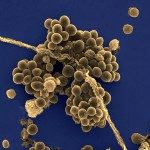Lien vers Pubmed [PMID] – 12950925
Mol. Microbiol. 2003 Sep;49(6):1615-25
D-alanylation of lipoteichoic acid (LTA), allows Gram-positive bacteria to modulate their surface charge, regulate ligand binding and control the electromechanical properties of the cell wall. In this study, the role of D-alanyl LTA in the virulence of the extracellular pathogen Streptococcus agalactiae was investigated. We demonstrate that a DltA- isogenic mutant displays an increased susceptibility to host defence peptides such as human defensins and animal-derived cationic peptides. Accordingly, the mutant strain is more susceptible to killing by mice bone marrow-derived macrophages and human neutrophils than the wild-type strain. In addition, the virulence of the DltA- mutant is severely impaired in mouse and neonatal rat models. This mutant was eliminated more rapidly than the wild-type strain from the lung of three-week-old mice inoculated intranasally and, consequently, is unable to induce a pneumonia. Finally, after intravenous injection of three-week-old mice, the survival of the DltA- mutant is markedly reduced in the blood in comparison to that of the wild-type strain. We hypothesize that the decreased virulence of the DltA- mutant is a consequence of its increased susceptibility to cationic antimicrobial peptides and to killing by phagocytes. These results demonstrate that the D-alanylation of LTA contributes to the virulence of S. agalactiae.

